With Mabel “hopefully” pregnant and Emma just coming into season, I thought it was a great time to cover this topic.
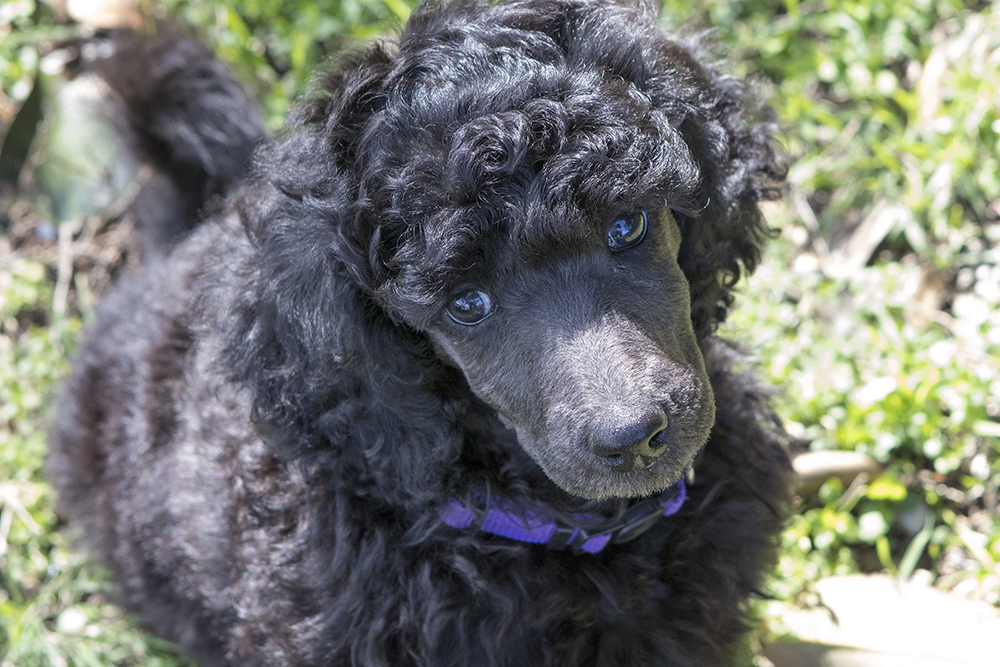
Puppy selection can be a frightening experience for new pet owners. What if I get the wrong puppy for my home? What should I look for when evaluating a young litter of dogs? If you seek out a puppy from a quality breeder, many of these decisions will be handled for you, or at the very least you will be provided with information on the pups available for you to make your own educated decision. This is probably the best reason to seek out a well-bred puppy from a responsible breeder.
Many people have no idea what they should be looking for in that next pet. Here are a few ways to help you narrow down your search. By providing this information to your breeder, you significantly increase the odds of ending up with a puppy who fits your needs.
- Activity
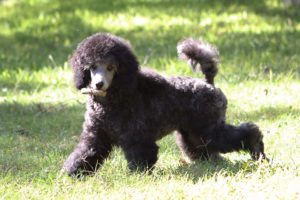 level of your home. Are you an active person who takes daily walks / jogs or do you spend most nights reading, playing games, or watching TV? Being honest with yourself is extremely important. Select a breed, then a breeder, based on the reality of your lifestyle. Do not go into getting a dog ‘hoping’ the dog will force you to become more active. Sometimes this does work, but more often than not people return to old habits and the dogs are the ones to suffer. Opt for an adult if you can’t see surviving puppy hood.
level of your home. Are you an active person who takes daily walks / jogs or do you spend most nights reading, playing games, or watching TV? Being honest with yourself is extremely important. Select a breed, then a breeder, based on the reality of your lifestyle. Do not go into getting a dog ‘hoping’ the dog will force you to become more active. Sometimes this does work, but more often than not people return to old habits and the dogs are the ones to suffer. Opt for an adult if you can’t see surviving puppy hood. - Do all adults have full time jobs/school? We breeders LOVE having one member of the household work from home or enjoying retirement. In reality, this isn’t a reasonable request. The average household is a duel incoming home. If this is the case for your family, you have several options. First, you can hire someone to come walk / train the puppy mid-day. I love this option, but sometimes it can be hard to find someone you trust to come into your home when you are away. Second is to offer a large area with many mentally stimulating things where you can set up a potty area and do not mind cleaning up a mess of toys and litter after a long day at work. As the puppy matures, you can slowly decrease the play area. If possible, I tell busy homes to select a more independent puppy as they are less likely to develop separation issues and often enjoy playing calmly alone. Having a dog who can entertain themselves is sheer bliss. I tend to keep the lap puppy, the clingy, hang on your every word dog. While they are devoted companions, if left alone for long periods these dogs can develop coping mechanisms which can cause both you and them mental and physical pain. Knocking over the trash, counter surfing, ripping up beds or even the couch, barking, chewing, pacing, eating clothing and other items are all signs of separation anxiety. Prevention (never letting them know they CAN dump the trash) is always best, but if you see these things developing act quickly to curb the issue with professional training.
 Quick story. I took in a litter for a good friend who was in the middle of moving and needed to find homes for most of the pups. One of those darling babies was going to be my puppy. If I had to decide who I would take the day I evaluated the litter I would have selected the only female. Instead, I took home 7 precious babies and had the pleasure of living with the group for several weeks. There was this single male puppy who was extremely independent. He would wander off, play quietly by himself, or hang out with my adult dogs. He wasn’t a lap dog. He wasn’t a snuggler. This was not a puppy I would normally keep, but my dogs adored him and I loved his mental stability. After some soul searching I decided to keep this independent puppy who didn’t score well on his aptitude testing, because he wouldn’t play the game. Code has turned into one of the most incredible dogs I have ever known. He is kind and empathetic without being clingy, a willing working partner who loves to show and compete, he will lay around the house or go fetch a ball for hours on end, never stresses about the future (so many Standard Poodles are worriers), and is always happy to play by himself or with a friend. This dog is a happy dog who doesn’t fear the future. Code doesn’t need a special person to make his world perfect, but he is super thrilled to be in our lives and living in our home. A cuddle monster he is not. I try to get him up on the couch to watch a show with me and he would rather play ball by himself or curl up on his bed alone. Those independent things I noted as a puppy have softened, but give him a touch more resilience than other dogs I have owned in the past. Do not discount the puppy who wanders away on the breeders videos to go explore the yard or chase a butterfly. You might find that spark of independence is exactly what your family needs during this point of your life. I know it is what we needed with an active home with young kids always coming and going. Do I love having a dog who would die for me, completely devoted? Sure, but right now I needed a dog who loves the entire family, not just his main care giver and trainer.
Quick story. I took in a litter for a good friend who was in the middle of moving and needed to find homes for most of the pups. One of those darling babies was going to be my puppy. If I had to decide who I would take the day I evaluated the litter I would have selected the only female. Instead, I took home 7 precious babies and had the pleasure of living with the group for several weeks. There was this single male puppy who was extremely independent. He would wander off, play quietly by himself, or hang out with my adult dogs. He wasn’t a lap dog. He wasn’t a snuggler. This was not a puppy I would normally keep, but my dogs adored him and I loved his mental stability. After some soul searching I decided to keep this independent puppy who didn’t score well on his aptitude testing, because he wouldn’t play the game. Code has turned into one of the most incredible dogs I have ever known. He is kind and empathetic without being clingy, a willing working partner who loves to show and compete, he will lay around the house or go fetch a ball for hours on end, never stresses about the future (so many Standard Poodles are worriers), and is always happy to play by himself or with a friend. This dog is a happy dog who doesn’t fear the future. Code doesn’t need a special person to make his world perfect, but he is super thrilled to be in our lives and living in our home. A cuddle monster he is not. I try to get him up on the couch to watch a show with me and he would rather play ball by himself or curl up on his bed alone. Those independent things I noted as a puppy have softened, but give him a touch more resilience than other dogs I have owned in the past. Do not discount the puppy who wanders away on the breeders videos to go explore the yard or chase a butterfly. You might find that spark of independence is exactly what your family needs during this point of your life. I know it is what we needed with an active home with young kids always coming and going. Do I love having a dog who would die for me, completely devoted? Sure, but right now I needed a dog who loves the entire family, not just his main care giver and trainer.
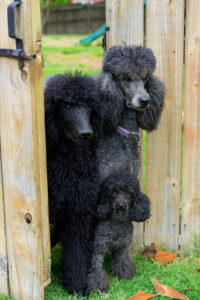 Urban, Suburban, or Rural lifestyle? Do you live in an apartment? I’ve placed many Standard Poodles in homes with no yard, but I always state over and over how active this breed is, how important it is that they get mental and physical exercise while growing. The breed as a whole has higher than average prey drive. If you live on a farm, seeking a lower prey drive breed is best, but if you are set on a Poodle, get a puppy and be prepared to teach a ton of impulse control. Educate yourself on what impulse control means, because it is a vital skill for any rural pet. Life on the farm often equals loose dogs and wild animals at every turn. Standard Poodles are naturals in suburbia, so any home outside this picture needs to go into puppy selection within idea of what they need for the place they live. Please note, prey drive is extremely hard to determine in a very young puppy. We do our best, but Poodles of all sizes tend to enjoy chasing, so just because an aptitude test shows a lower prey drive do not count on that staying true as they mature. One of the major reasons Poodles flunk out as service dogs is their prey drive.
Urban, Suburban, or Rural lifestyle? Do you live in an apartment? I’ve placed many Standard Poodles in homes with no yard, but I always state over and over how active this breed is, how important it is that they get mental and physical exercise while growing. The breed as a whole has higher than average prey drive. If you live on a farm, seeking a lower prey drive breed is best, but if you are set on a Poodle, get a puppy and be prepared to teach a ton of impulse control. Educate yourself on what impulse control means, because it is a vital skill for any rural pet. Life on the farm often equals loose dogs and wild animals at every turn. Standard Poodles are naturals in suburbia, so any home outside this picture needs to go into puppy selection within idea of what they need for the place they live. Please note, prey drive is extremely hard to determine in a very young puppy. We do our best, but Poodles of all sizes tend to enjoy chasing, so just because an aptitude test shows a lower prey drive do not count on that staying true as they mature. One of the major reasons Poodles flunk out as service dogs is their prey drive.- Age of all members of your family, including other pets. Do you have any elderly people or pets living in your home? If so, you might want to select a calm, sweet, and gentle puppy who will not rock the boat or push boundaries. Bringing home the ‘in your face’ puppy who was grabbing pant legs and tugging on your shoe strings might seem like a good idea, but I assure you, it is not. That puppy will irritate your 13 year old senior, constantly asking to play. So much joy shall not be contained just because your elderly mother walked into the room. Stack the odds in your favor by selecting a more sedate puppy, one who has a lower energy level to start, so you are not having to bring the dog down mentally from such sky high heights! The same holds true if you have very young children. I have twins and I can tell you, I did NOT raise a puppy until they were nearly four years old, because I tend to keep the obnoxious ones. It wouldn’t be fair to the kids or the dog. If you are set on getting a puppy when you have a young, growing family, select one of the lower drive babies from the litter. If possible, go for a puppy from extremely calm parents. Stack the odds in your favor.
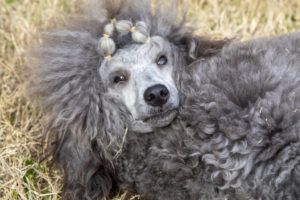 How much time are you willing to devote to a new pet? In all honesty, it doesn’t take a lot of ‘formal’ training to make a nice pet. I can get a well socialized dog ready for novice rally in a few short weeks, with 2-3 short ten minute training sessions a day. Teaching a dog some ‘tricks’ is easy. Educating a dog about what it means to be a member of my household takes immersion and time. When I raise a new puppy they are tethered to me or crated / tethered near me for the first 6 months of their life. My household dogs do not counter surf, they don’t steal food from the table, they are calm inside the house, my intact males don’t pee all over the house, etc. Why is this? Well, my dogs are in training 24-7. They sleep next to my bed, so I can hear them if they need to go out at night. Quickly new babies learn to potty and go back to sleep, because mom isn’t having any late night parties! One of the first things I teach is to never cross a threshold without permission, which is super easy if the puppy is on leash. Cooking is something I do almost every week night and the pups learn early on to go chew on a bone on their ‘bed’ (an exercise pen around a dog cot) while I cook dinner. This teaches them to settle when I cannot focus on them. When we watch TV, the puppy is right under our feet or up in our laps, with everyone reminding them popcorn is for those who don’t beg or attempt to take it for themselves. One the flip side, I will crate a puppy in another room for naps daily. I vary the room so the pup doesn’t know which crate they will be in or for how long. I reward calm and quiet, I ignore fussing. You must teach the puppy how to be a part of the family, but also teach them how to be apart from the family. Both are needed for a mental sound adult dog. If you are not ready to spend the next 6 months of your life totally devoted to teaching your new pet how to behave both at home and in public, maybe you should seek out an adult. Raising a puppy is no joke, but I assure you the time you put in will yield an incredible companion.
How much time are you willing to devote to a new pet? In all honesty, it doesn’t take a lot of ‘formal’ training to make a nice pet. I can get a well socialized dog ready for novice rally in a few short weeks, with 2-3 short ten minute training sessions a day. Teaching a dog some ‘tricks’ is easy. Educating a dog about what it means to be a member of my household takes immersion and time. When I raise a new puppy they are tethered to me or crated / tethered near me for the first 6 months of their life. My household dogs do not counter surf, they don’t steal food from the table, they are calm inside the house, my intact males don’t pee all over the house, etc. Why is this? Well, my dogs are in training 24-7. They sleep next to my bed, so I can hear them if they need to go out at night. Quickly new babies learn to potty and go back to sleep, because mom isn’t having any late night parties! One of the first things I teach is to never cross a threshold without permission, which is super easy if the puppy is on leash. Cooking is something I do almost every week night and the pups learn early on to go chew on a bone on their ‘bed’ (an exercise pen around a dog cot) while I cook dinner. This teaches them to settle when I cannot focus on them. When we watch TV, the puppy is right under our feet or up in our laps, with everyone reminding them popcorn is for those who don’t beg or attempt to take it for themselves. One the flip side, I will crate a puppy in another room for naps daily. I vary the room so the pup doesn’t know which crate they will be in or for how long. I reward calm and quiet, I ignore fussing. You must teach the puppy how to be a part of the family, but also teach them how to be apart from the family. Both are needed for a mental sound adult dog. If you are not ready to spend the next 6 months of your life totally devoted to teaching your new pet how to behave both at home and in public, maybe you should seek out an adult. Raising a puppy is no joke, but I assure you the time you put in will yield an incredible companion.
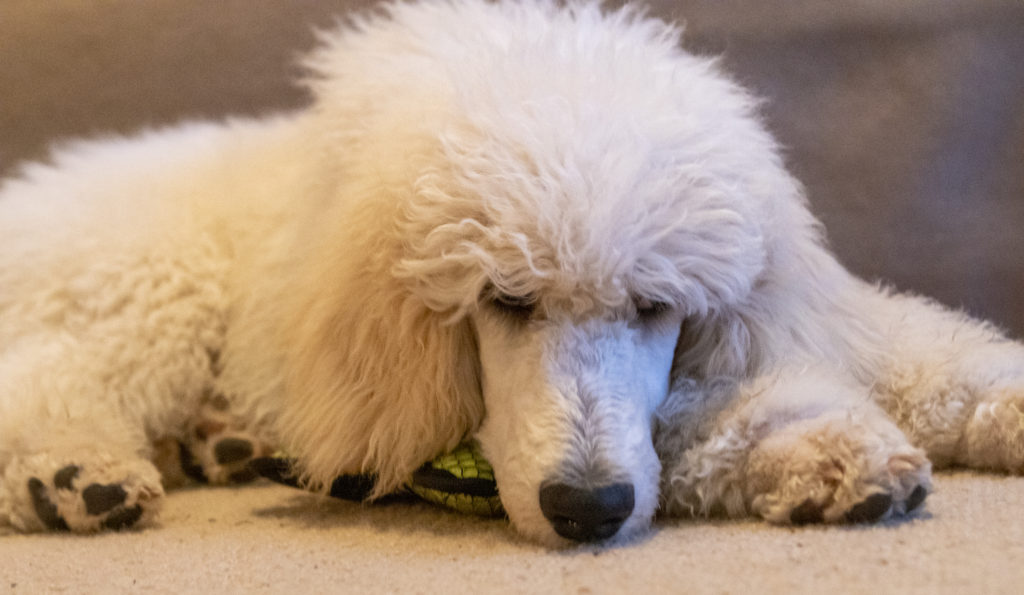
There is only so much breeders can tell about the future personality of a young puppy. Quality breeders will explain to you what they have seen during the puppy’s short life, but it is only a snapshot. We are lucky to have a few short weeks of glimpsing their future personality in order to match each home’s needs. All temperaments can be shaped to one degree or another, but some things are inborn and hard to change. First, and most critically, is to pick a breed who innately has many traits you desire. Next, selecting a breeder whose dogs have the behaviors you need for your lifestyle. Finally, trusting your breeder to help select a puppy that should mature to fit your home is the last piece to a future fabulous furry friend. In short, take care in deciding exactly what breed will fit your home, research breeders who actively breed dogs that match your goals, and provide the breeder with the information above so they can help you fill the next 15 years with both love and joy.
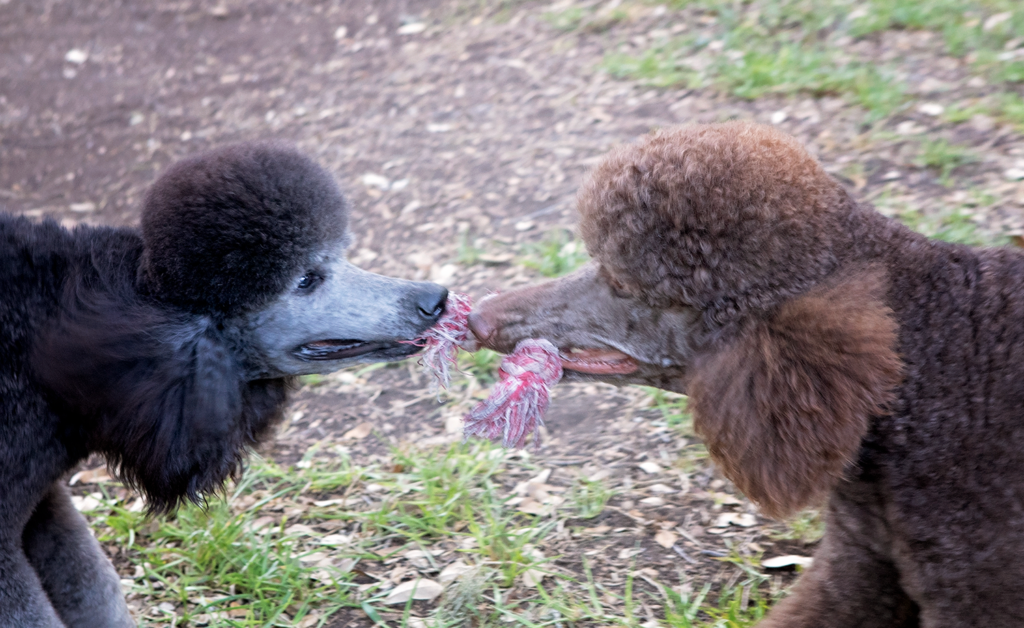
On an unrelated note, my website has been a painful sore over the last few months. I’ve had this same website for 20 years, this blog for over half of that time. Using different editors and watching the internet grow has been an experience, but because of that growth my blog cannot easily be changed to HTTPS without breaking all the pages. I’ve tried it for several weeks and even Bluehost can’t track down all the problems. WordPress is forcing the issue as well as Google by boycotting and dropping my search rating until the blog meets the ‘S’ requirement. This means, I have to go back and track down any coding issues for over ten years, which will be an impossible task. In short, I am being forced to wipe the site, start fresh. I’m going to go back and save all the articles I have written that I feel have true value and post them again, possibly update some with more recent information, but links will be broken. Anyway, it is a frustrating process, especially with upcoming litters. I’ll be making another post about this topic soon. Just something everyone needs to be aware of in the upcoming months.
Becky Baxter – Anutta Poodles
